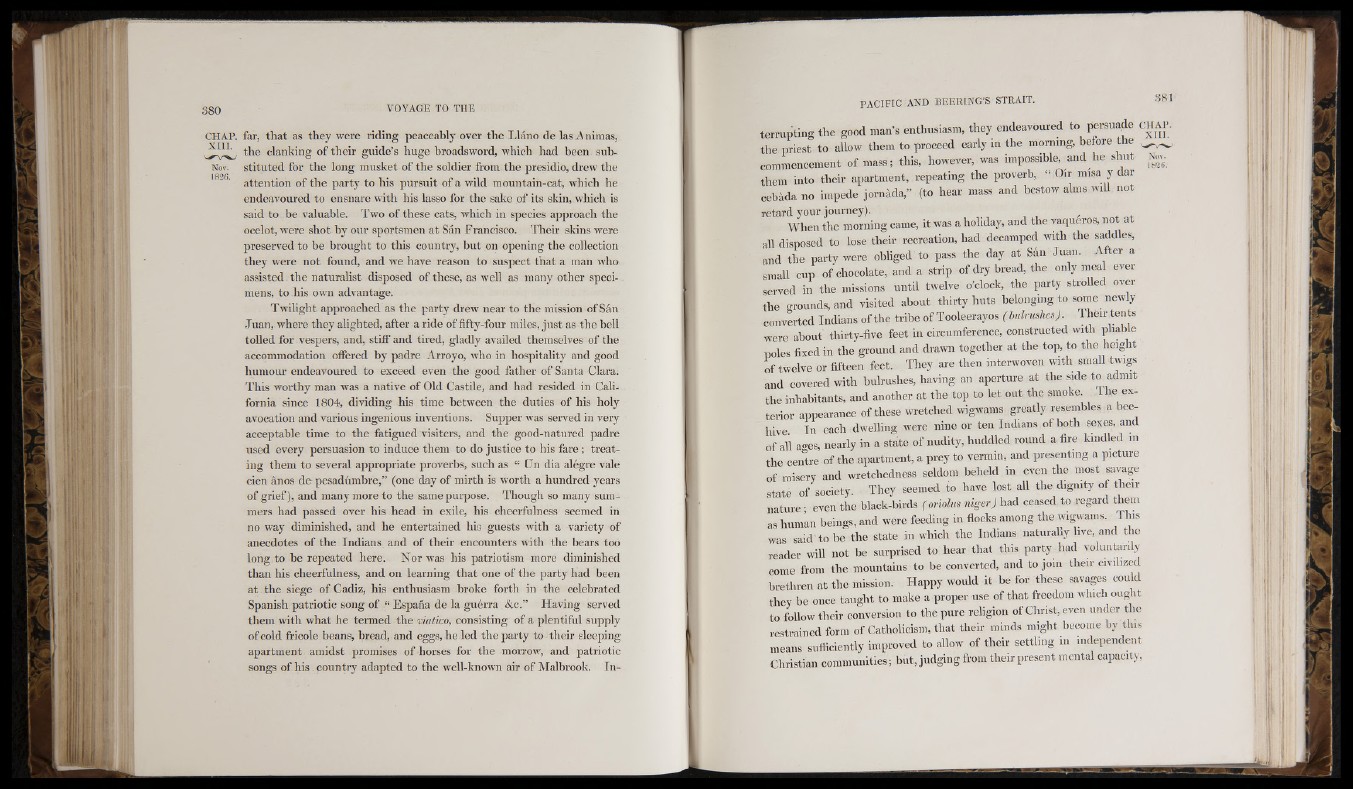
CHAP. far, that as they were riding peaceably over the Lláno de las Animas,
7 1 7 . Ih® clanking of tlieir guide’s huge broadsword, which had been suh-
Nov. stitiited for the long musket of the soldier from the presidio, drew the
attention of the party to his pursuit of a wild mountain-cat, which he
endeavoured to ensnare with his lasso for the sake of its skin, which is
said to be valuable. Two of these cats, which in species approach the
ocelot, were shot by our sportsmen at Sán Francisco. Their skins were
preserved to be brought to this country, but on opening the collection
they were not found, and we have reason to suspect that a man who
assisted the naturalist disposed of these, as well as many other specimens,
to his own advantage.
Twilight approached as the party drew near to the mission of Sán
Juan, where they alighted, after a ride of fifty-four miles, just as the bell
tolled for vespers, and, stiff and tired, gladly availed themselves of the
accommodation offered by padre Arroyo, who in hospitality and good
humour endeavoured to exceed even the good father of Santa Clara.
This worthy man was a native of Old Castile, and had resided in California
since 1804, dividing his time between the duties of his holy
avocation and various ingenious inventions. Supper was served in very
acceptable time to the fatigued visiters, and the good-natured padre
used every persuasion to induce them to do justice to his fare ; treating
them to several appropriate proverbs, such as “ Un dia alégre vale
cien ános de pesadámbre,” (one day of mirth is worth a hundred years
of grief), and many more to the same purpose. Though so many summers
had passed over his head in exile, his cheerfulness seemed in
no way diminished, and he entertained his guests with a variety of
anecdotes of the Indians and of their encounters with the bears too
long to be repeated here. Nor was his patriotism more diminished
than his cheerfulness, and on learning that one of the party had been
at the siege of Cadiz, his enthusiasm broke forth in the celebrated
Spanish patriotic song of “ España de la guèrra &c.” Having served
them with what he termed the viatico, consisting of a plentiful supply
of cold fricóle beans, bread, and eggs, he led the party to their sleeping
apartment amidst promises of horses for the morrow', and patriotic
songs of his country adapted to the well-know'n air of Malbrook. In-
terrupting the good man’s enthusiasm, they endeavoured to persuade CHAl-
the priest to allow them to proceed early in the morning, before the ,
commencement of mass; this, however, was impossible, and he shut
Nov.
IS2C.
them into their apartment, repeating the proverb, “ Oír misa y dar
cebada no impede jornada,” (to hear mass and bestow alms will not
retard your journey). ^
When the morning came, it was a holiday, and the vaqueros, not at
all disposed to lose their recreation, had decamped with the saddles,
and the party were obliged to pass the day at Sán Juan. After a
small cup of chocolate, and a strip of dry bread, the only mea ever
served in the missions nntil twelve o’clock, the party strolled over
the <n-ounds,and visited about thirty huts belonging to some newly
converted Indians of the tribe of Tooleerayos (bulrushes).
were about thirty-five feet in circumference, constructed with pliable
poles fixed in the ground and drawn together at the top, to the height
of twelve or fifteen feet. They are then interwoven with small twigs
and covered with bulrushes, having an aperture at the side to admit
the inhabitants, and another at the top to let out the smoke. The exterior
appearance ofthese wretched wigwams greatly resembles a beehive
In each dwelling were nine or ten Indians of both sexes, and
of all a-es, nearly in a state of nudity, huddled round a fire kindled 111
the ceiffre of the apartment, a prey to vermin, and presenting a picture
of misery and wretchedness seldom beheld in even the most savage
state of society. They seemed to have lost all the dignity of their
nature • even the black-birds (oriolus nigcr) had ceased to regard them
as hurami beings, and were feeding in flocks among the wigwams. This
was said to be the state in which the Indians naturally live, and the
rJader will not be surprised to hear that this party had voluntarily
come from the mountains to be converted, and to join their civilized
brethren at the mission. Happy would it be for these savages could
they be once taught to make a proper use of that freedom which ought
to follow their conversion to the pure religion of Christ, even under the
restrained form of Catholicism, that their minds might become by this
means sufficiently improved to allow of their settling in independent
Christian communities; but, judging from their present mental capacity,
lit.